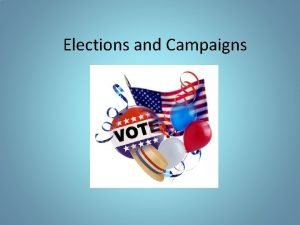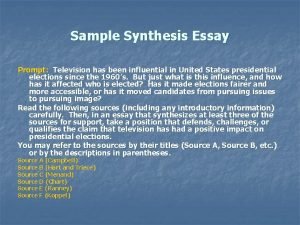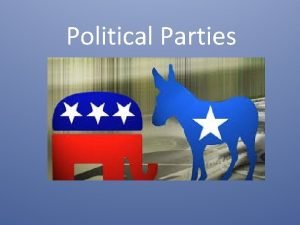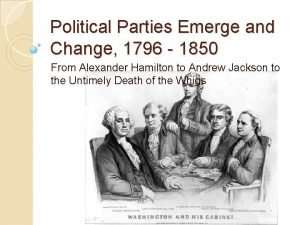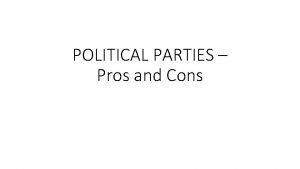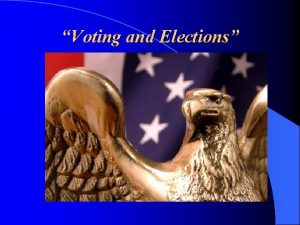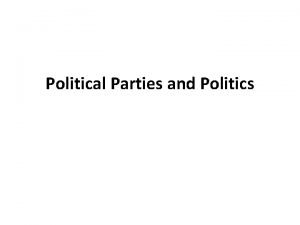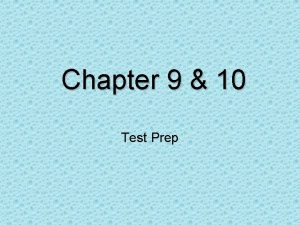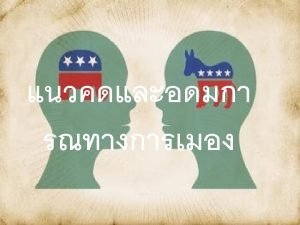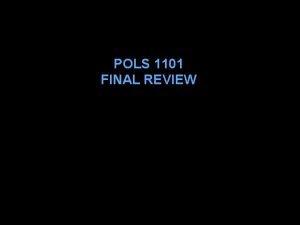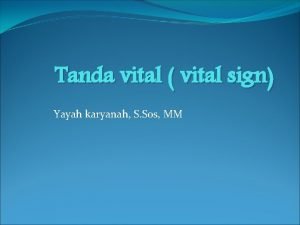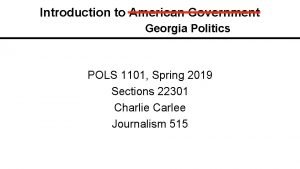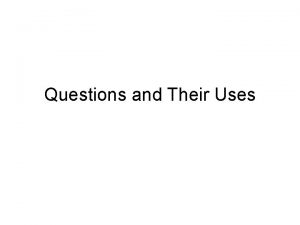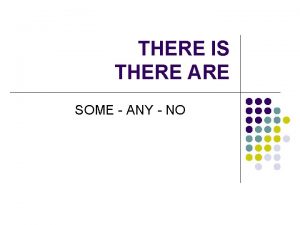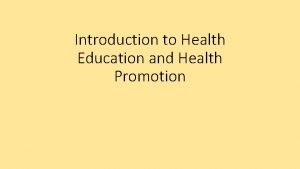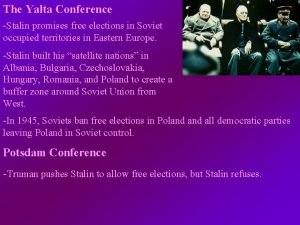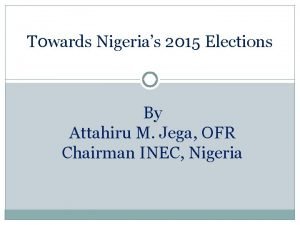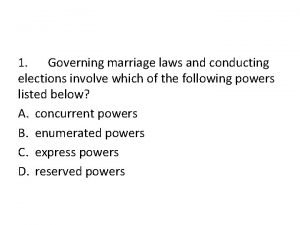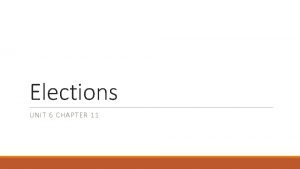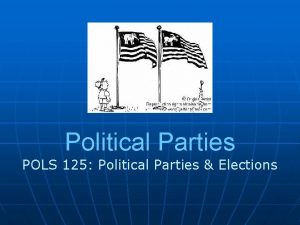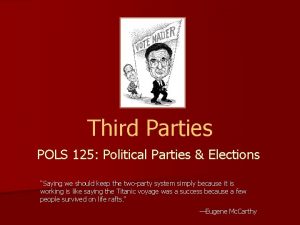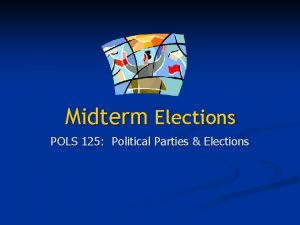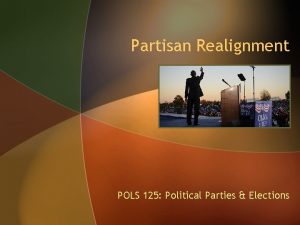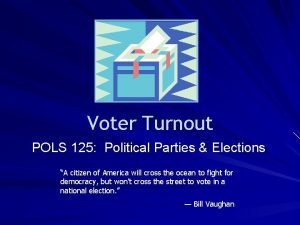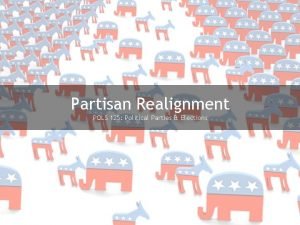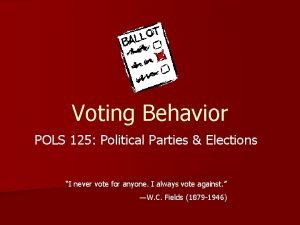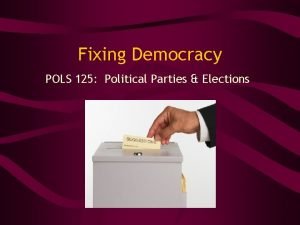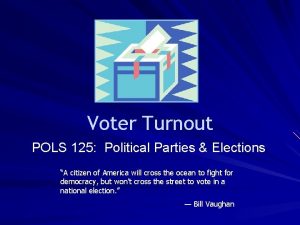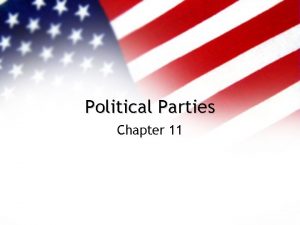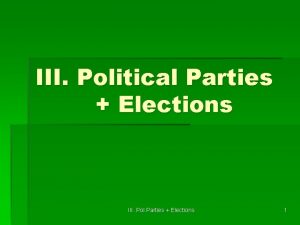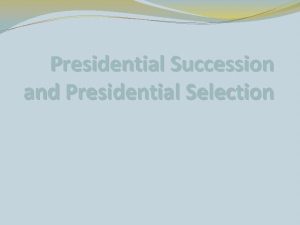Presidential Elections POLS 125 Political Parties Elections Any






















- Slides: 22

Presidential Elections POLS 125: Political Parties & Elections “Any American who is prepared to run for president should automatically, by definition, be disqualified from ever doing so. ” — Gore Vidal

The Electoral College Tally, 2008

How Presidents and Vice Presidents are Chosen

A certificate of ascertainment names of the electors chosen by the voters and the number of votes received. A certificate of vote lists all persons who received electoral votes for President and Vice president the number of electors who voted for each person.

Are electors bound by law to cast their vote for a specific candidate? n Yes in these states: AL, AK, CA, CO, CT, DC, FL, HI, ME, MD, MA, MI, MS, MT, NE, NV, NM, NC, OH, OK, OR, SC, VT, VA, WI, WY. (those in yellow are bound by “party pledges”) n No in these states: AZ, AR, DE, GA, ID, IL, IN, IA, KS, KY, LA, MN, MO, NH, NJ, NY, ND, PA, RI, SD, TN, TX, UT, WV.

Arguments for the Electoral College n n Contributes to the cohesiveness of the country by requiring a distribution of popular support to become president; Enhances the status of minority interests; Contributes to the political stability of the nation by encouraging a two-party system; Maintains the federal system of government and representation;

Arguments Against the Electoral College n n The possibility of electing president receiving a minority of the popular vote; The risk of so-called “faithless” electors; The possible role of the Electoral College in depressing voter turnout; Failure to accurately reflect the popular will;

Consequences

Consequences

Reforming the Electoral College n n n Do nothing—maintain the status quo. Abolish the electoral college outright and use a direct popular vote to determine outcomes—weigh individual votes equally everywhere: one person, one vote. Retain the apportionment of the electoral college but allow for a proportional allocation of electoral votes. Retain the apportionment of the electoral college but allocate one electoral vote for every congressional district a presidential candidate carries plus two more for each state. Adopt a national bonus plan that would maintain the Electoral College but add 102 electoral votes to the existing total of 538 and award all of the bonus votes to the national popular-vote winner.

Four Methods for Aggregating Votes Year Candidate Electoral College 1960 Nixon 219 266. 1 278 49. 5 Kennedy 303 265. 6 245 49. 8 Byrd 15 5. 3 14 0. 7 Ford 240 258. 0 269 48. 0 Carter 297 269 50. 1 Others 1 10. 2 0 1. 9 Gore 266 258. 4 267 48. 2 Bush 271 260. 2 271 48. 0 Others 0 19. 4 -- 3. 8 1976 2000 Proportional Plan District Plan Direct Popular Vote

Why Great Men are Not Chosen Presidents In America, which is beyond all other countries the country of a ‘career open to talents, ’ a country, moreover, in which political life is unusually keen and political ambition widely diffused, it might be expected that the highest place would always be won by a man of brilliant gifts. But from the time when the heroes of the Revolution died out with Jefferson and Adams and Madison, no person expect General Grant, had, down till the end of last century, reached the chair whose name would have been remembered had he not been president except Abraham Lincoln had displayed rare of striking qualities in the chair. Who now knows or cares to know anything about the personality of James K. Polk or Franklin Pierce? The only thing remarkable about them is that being so commonplace they should have climbed so high. ” —James Bryce, The American Commonwealth (1888) James Bryce

The Presidential Nomination Process n n How does the process work (then vs. now)? Who does it advantage? Is further reform necessary? Are the qualities that make a good candidate the same qualities that make a good president?

Then and Now Bottom up, driven by primaries and caucuses PR ED IC T AB Top down, dominated by party elite O B I R G N LE

“It’s got a huge cast, the series goes on forever and Fred Thompson shows up at the end. ” —Mitt Romney, commenting on how the prolonged system of debates is a lot like an episode of Law & Order

The 2008 Electoral Calendar In 2008, the Democratic nomination for president was determined by 4, 317 delegate votes. A simple majority (2, 159) was needed to win. State primaries and caucuses determined how the 3, 520 “pledged delegates” voted. The remaining 797 “unpledged” delegates (or “superdelegates”) were party leaders and elected officials. They were permitted to vote for whomever they pleased. The nominee was officially declared at the Democratic party’s convention in Boston, July 26 -29. FRONTLOADING AND COMPRESSION January 3, 2008 March 2, 2004: “SUPER TUESDAY” Iowa caucuses Alabama, Alaska (caucuses), Arizona, Arkansas, California, Colorado (caucuses), Connecticut, Delaware, Georgia, Idaho (D caucuses), Illinois, Kansas (D caucuses), Massachusetts, Minnesota (caucuses), Missouri, Montana (R caucuses), New Jersey, New Mexico (D), New York, North Dakota (caucuses), Oklahoma, Tennessee, Utah, West Virginia, American Samoa (caucuses) January 8, 2008 New Hampshire primary

Iowa and New Hampshire "If you look at the caucuses system, they are dominated by the special interests in both parties. The special interests don't represent the centrist tendencies of the American people. They represent the extremes. " —Howard Dean, 2000


Why Great Men are Not Chosen Presidents: Revisited “It must also be remembered that the merits of a president are one thing and those of a candidate are another thing…. ” —James Bryce, The American Commonwealth

What kind of president do Americans want? A charismatic leader and man of conviction? A passionate leader who tells it like it is? A wellmeaning, ordinary guy? A man who can kick butt when he needs to?

Could these men be elected president today?

The Nomination System Appraised The presidential nominating process is not perfect, but in recent decades it has: n n n Enhanced participation; Improved demographic representation; Strengthened the tie between the average partisan and the candidates; Is this a bad thing? As constituted, the process gives advantage to candidates who are better known, can raise more money, have the most effective campaign organizations, and generate the most enthusiasm among the voters early in the presidential primary season. Source: Stephen J. Wayne, “Presidential Nominations and American Democracy, ” at: http: //usinfo. state. gov/products/ pubs/election 04/ nominate. htm
 Presidential elections exploration and announcement
Presidential elections exploration and announcement Ap lang synthesis essay television presidential elections
Ap lang synthesis essay television presidential elections Political parties
Political parties Political parties
Political parties Political parties
Political parties Political parties pros and cons
Political parties pros and cons Brainpop political parties
Brainpop political parties Political
Political The spoils system made political parties more powerful by
The spoils system made political parties more powerful by Wikimedia
Wikimedia Pols 1101 final exam study guide
Pols 1101 final exam study guide Nadi normal
Nadi normal Steunverband pols
Steunverband pols Shanshan lian uga
Shanshan lian uga Seknder
Seknder Any to any connectivity
Any to any connectivity There are some cake
There are some cake Any planned combination of education political
Any planned combination of education political Principles of health education
Principles of health education Stalin promise free elections
Stalin promise free elections Conclusion on elections
Conclusion on elections Governing marriage laws and conducting elections involve
Governing marriage laws and conducting elections involve “elections are key to democracy”
“elections are key to democracy”
